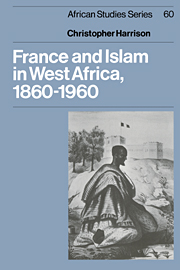Book contents
- Frontmatter
- Contents
- Acknowledgements
- Abbreviations
- Map
- 1 Introduction
- PART I 1850–1898: NINETEENTH-CENTURY ORIGINS OF FRENCH ISLAMIC POLICY
- PART II 1898–1912: THE FEAR OF ISLAM
- PART III FRENCH SCHOLARSHIP AND THE DEFINITION OF ISLAM NOIR
- Introduction
- 6 Scholar-administrators and the definition of Islam noir
- 7 The First World War
- PART IV 1920–1940: THE FRENCH STAKE IN ISLAM NOIR
- Notes
- Bibliography
- Index
7 - The First World War
Published online by Cambridge University Press: 01 February 2010
- Frontmatter
- Contents
- Acknowledgements
- Abbreviations
- Map
- 1 Introduction
- PART I 1850–1898: NINETEENTH-CENTURY ORIGINS OF FRENCH ISLAMIC POLICY
- PART II 1898–1912: THE FEAR OF ISLAM
- PART III FRENCH SCHOLARSHIP AND THE DEFINITION OF ISLAM NOIR
- Introduction
- 6 Scholar-administrators and the definition of Islam noir
- 7 The First World War
- PART IV 1920–1940: THE FRENCH STAKE IN ISLAM NOIR
- Notes
- Bibliography
- Index
Summary
THE WAR AND ISLAM
The outbreak of war in Europe in August 1914 and, more particularly, the break-off of diplomatic relations with the Ottoman Empire on 1 November inevitably caused great apprehension amongst the French administration. Clozel was the most anxious of all the administrators and asked for permission for special emergency powers, including the declaration of a state of siege, in order to deal with troublesome marabouts in the Sudan. Ponty, however, thought that such powers were unnecessary. He assured Paris that most African Muslims were not interested in the fate of the Ottoman Empire and in any case looked to the Moroccan Sherif rather than the Sultan of Turkey for ultimate spiritual guidance. The Governor-General went on to issue specific instructions to the local administrations of AOF: malicious rumours were to be suppressed and the traditional friendship between France and Islam was to be exalted throughout AOF. The successes of the French army (at this stage just beginning to recover from the initial German push into northern France) were to be likewise glorified. Nonetheless a careful watch on the marabouts was to be maintained, and a strict censorship of the post was to be enforced.
French anxieties were not confined to fear of Muslim unrest. The Liberian Christian prophet, Harris, and his followers who had for some time been active in the Ivory Coast, was seen as posing a very similar sort of threat as Ahmadu Bamba.
- Type
- Chapter
- Information
- France and Islam in West Africa, 1860–1960 , pp. 118 - 136Publisher: Cambridge University PressPrint publication year: 1988



